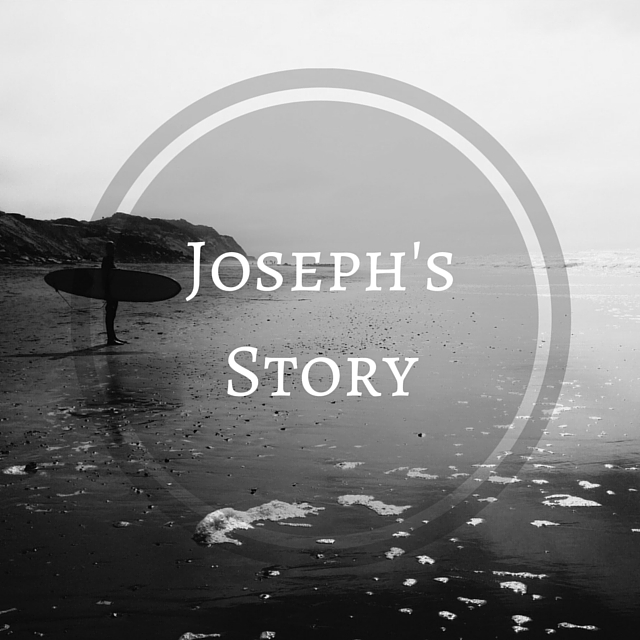“Userhat!” An authoritative voice echoed off the stone walls of the prison. “UserHAT!” A short, plump man, with grime clinging to his skin and thick stubble growing from his once clean shaven head groaned and rolled onto his back. “I’m sleeping,” he yelled back. “Userhat, report now or I will mark you as absent.” “For the love of Ra, Joseph, you know I’m here!” There was a slight pause, then the voice replied, ‘Ako, Userhat is absent, please notify the guards. Thaneni!” Cursing, Userhat threw himself off the stone bunk and staggered towards the voice. “I didn’t sleep. It was too hot” he whined as he passed a tall Hebrew man seated in front of a dozen other disgraced Egyptian noblemen. “That surprises me,” The Hebrew replied coolly, “I distinctly recall your hearing your snores for the majority of the night.” Userhat sniffed and stood with the rest of the inmates. “Hebrew scum”, he thought.
Joseph scratched the final details onto the scroll and handed it to the seven foot Egyptian giant standing next to him. Overall, Joseph was pleased with the order he had established within the prison. Having authority over a dozen spoilt, corrupt Egyptian officials in an Egyptian prison is not exactly how he had imagined his life turning out, but ever the opportunist, Joseph had seized the chance to establish his influence. Mahu, the keeper of the prison, made it no secret that he had little interest in the petty squabbling of his privileged prisoners and had happily turned the responsibility for day to day order over to Joseph, whom he had taken a liking to. Mahu rarely visited the prison now days; Joseph maintained order and control much better than he ever had, but Mahu would drop by every now and again and have a laugh with the strangely charismatic Hebrew prisoner.
“It is almost the ninth hour, if you have family visiting you today, please go and receive your food. Ako will be watching to ensure that no portions somehow disappear.” The giant known as Ako scowled at the four prisoners who made their way to the prison gate and followed them. The only source of food for the prison came from the families of the prisoners, and consequently there was an uneven distribution amongst the inmates and frequent squabbles. One of Joseph’s first initiatives had been to collect all the food brought in by relatives and distribute it evenly amongst the inmates. The consequences of favouritism and an unequal distribution of goods lead were deeply entrenched in Joseph’s memory, and to be avoided at all costs.
Dusk was settling and Joseph could hear a soft breeze rippling over the river and the chatter of palace maids washing clothes and gossiping. He ate the last of his portion of bread and popped a few dates into his mouth; an unexpected treat from one inmate’s mother-in-law. Wearily, Joseph etched another mark onto the growing tally that adored the curved stone wall above his stone bed. It had been one hundred and seven days since he had heard reports that the palace cup bearer had been pardoned by Pharaoh, just as Joseph had foretold through the interpretation of his dream. “Remember me,” Joseph had begged him, “I too have been falsely accused, please mention me to the King and save me from this place!” Joseph had been so sure that he was soon to see justice and be freed. Eleven years a prisoner and he had not once doubted that God was with him and would restore him, and the opportunity to speak to the cup bearer of the King had felt so providential. As the cupbearer described his dream, Joseph had felt that all too familiar warmth grow in his heart and spread out to his hands and feet. The tingling excitement and expectation of the still small voice that whispered “pay attention” and the dawning understanding that flooded into his consciousness. He had not slept that night, the anticipation of freedom causing a childlike restlessness. But the days passed, and no one sent for the Hebrew man who possessed the gift of dream interpretation. The cupbearer’s relief and joy quickly overtook him, and he pushed the memories of his time in prison away. Joseph’s hope had slowly given way to frustration, anger and bitterness. He laid down, bit his lip and clenched his fists. He could hear the groans of the other prisoners as they tried to get comfortable on the stone ledge, and the unmistakable snores of Userhat. Where was the great God of his fathers? The mighty Yahweh of Abraham, Isaac and Jacob? Certainly not in the prison cell of the once favoured son of Rachel. As he fell into a fitful sleep the moon rose full and graceful above the sparkling waters of the Nile.
Readings: Genesis 37, 39-41, 50:15-21
“But when his brothers saw that their father loved him more than all his brothers, they hated him and could not speak peacefully to him.” Genesis 37:4
“They saw him from afar, and before he came near to them they conspired against him to kill him” Genesis 37:18
Joseph was the original tall poppy of the bible. Whatever situation he found himself in he excelled. Joseph displayed remarkable leadership qualities in a huge variety of contexts; a simple farm, an Egyptian household, a prison, and eventually over all of Egypt. But whenever Joseph succeeded, there were people who were jealous and wanted to bring him down. Have you ever experienced attacks from others when you have been striving for success? How did you respond?
“But the Lord was with Joseph and showed him steadfast love and gave him favour in the sight of the keeper of the prison. And the keeper of the prison put Joseph in charge of all the prisoners who were in the prison. Whatever was done there, he was the one who did it.” Genesis 39:21
Ever the opportunist, Joseph did not dwell on what he lacked but focused on what he could achieve in any situation. No matter where he found himself, even incarcerated in a foreign prison, Joseph committed to use his gifts. Are you currently in a situation where it feels impossible to use your gifts? Do you feel trapped and constrained, as if you are living in a virtual prison? How might you continue to use your gifts and make the most of the situation, just as Joseph did?
“Only remember me, when it is well with you, and please do me the kindness to mention me to Pharaoh and so get me out of this pit” Genesis 40:14
“Yet the chief cupbearer did not remember Joseph, but forgot him. After two whole years, Pharaoh dreamed that he was standing by the Nile…” Genesis 40:22-41:1
When Joseph interpreted the dreams of the baker and the cupbearer to the Pharaoh, he thought that this was the moment when God would break through and deliver him. But he had to wait another two years before the cupbearer remembered Joseph and mentioned him to the Pharaoh. Sometimes we may feel as if we are about to break out of The Waiting Place, only to be mistaken, and have to endure it a little longer. Have you experienced similar false starts in your Waiting Place experience?
“Until the time came to fulfill his dream, the Lord tested Joseph’s character” Psalm 105:19
Joseph received the vision that he was destined to be a great leader at 17 years of age, but the vision was not fulfilled until he was thirty. The majority of this time was spent in prison. At seventeen, he did not yet have the skills or character necessary to rule over Egypt. The Waiting Place can be painful, but it can also be an incredible time of growth.
Reflection
Sometimes The Waiting Place looks like injustice. Like Joseph, we may suffer from the deliberate attacks from others who are jealous of our success, talents, vision, or opportunities. But injustice can also look like an illness, a tragedy or crisis; heartache and pain that is incomprehensible and deeply unfair. Perhaps you have been imprisoned by depression, anxiety or other chronic and debilitating illness. You will know what it is like to be trapped, watching the world going by, and feeling separate, cut off, limited and alone; your own body or mind fighting against you, and the fatigue that accompanies the daily grind of life. Perhaps it is the loss of someone or something; a broken relationship, the death of a parent, a failed business venture. Grief wraps its arms around you, enveloping you and your hope, leaving your vision blurred and distorted. Perhaps it was a crisis or unexpected burden that you now have to find the strength to carry; a child with a disability, a parent with dementia, the loss of income. The added burdens and stresses that are so heavy you feel as if physical chains are holding you down, and try as you might you cannot escape them. When we experience the Waiting Place in a prison, our frustration and pain are amplified and echo off the walls around us. We are contained, stuck, trapped. Our lives are characterised by inaction, and yet we are continually fatigued. We can hear and see those who linger on the edge of our prison walls living and engaging in life in a way that we are unable to do. We see people living out their freedom, unaware of the gift that it is, unaware of the pain it causes those of us who are locked in The Waiting Place. It is easy to feel bitter when we are imprisoned. It is easy to feel envious of those who live out their lives in freedom, and have not experienced the injustices of life. There is grief, anger, frustration and deep pain to process when we experience injustice. But the great danger of The Waiting Place is not that we will be imprisoned forever, but that we will fail to recognise once we have been set free. Sometimes, we have been in the The Waiting Place so long it becomes part of our identity, and even once freedom comes, we are unable to move forward, as we believe the chains are unbreakable. But when we examine the life of Joseph, he moved boldly out of The Waiting Place and into the next season. He was able to move on, and be used by God. He learned from his past, but he did not take his past with him, and did not allow his past to consume his identity. Jesus began his ministry of earth by quoting the words from Isaiah 61 “The Spirit of the Lord is upon me, because he has anointed me to proclaim good news to the poor. He has sent me to proclaim liberty to the captives and recovery of sight to the blind, to set at liberty those who are oppresses, to proclaim the year of the Lord’s favour” (Luke 4:18-19). If you are in The Waiting Place of injustice, particularly if it has been a long road, remember that Jesus can break the chains that bind you and set you free.





